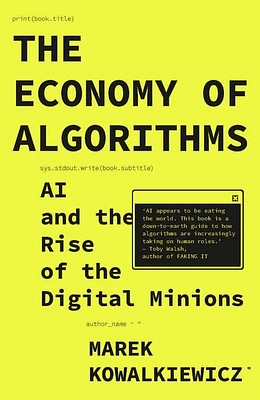Home
On-Platform Organisations: The Algorithmization beyond Digitalization
Loading Inventory...
Barnes and Noble
On-Platform Organisations: The Algorithmization beyond Digitalization
Current price: $250.00


Barnes and Noble
On-Platform Organisations: The Algorithmization beyond Digitalization
Current price: $250.00
Loading Inventory...
Size: OS
*Product Information may vary - to confirm product availability, pricing, and additional information please contact Barnes and Noble
*** Beware: there is a free white paper with 99% of this information published at SSRN ***
The natural alignment between business and architecture within big techs has boosted their transformation (crucially, upon API-fication and synergies exploitation) compared to that in the rest of organisations. The efficiency gap is so large that even the latter fear the irruption of big techs in their own arenas. Nevertheless, organisations have lately lost control of their architectures. They have become a mix of services offered by big techs and orchestrated by external consultants. Such a dynamic has naturally led to a large convergence between architectures across industries in spite of their idiosyncratic differences. Hence, there is room for improvement through a transformation governance that optimally weighs both microeconomics and microservices. As neither of the fields is easy to master, such an improvement remains a greenfield. This paper proposes a novel data architecture paradigm, Data MAPs, that helps organisations take control of their transformation journey by becoming platforms - i.e. unlocking convergence with big techs' efficiency levels. Further, it surpasses the theory by having evolved Data MAPs' first instance for the last 7 years. Along that time, the authors gathered real examples that filled out a cube defined by a series of dimensions significant enough to assert the universal validity of their approach.
The natural alignment between business and architecture within big techs has boosted their transformation (crucially, upon API-fication and synergies exploitation) compared to that in the rest of organisations. The efficiency gap is so large that even the latter fear the irruption of big techs in their own arenas. Nevertheless, organisations have lately lost control of their architectures. They have become a mix of services offered by big techs and orchestrated by external consultants. Such a dynamic has naturally led to a large convergence between architectures across industries in spite of their idiosyncratic differences. Hence, there is room for improvement through a transformation governance that optimally weighs both microeconomics and microservices. As neither of the fields is easy to master, such an improvement remains a greenfield. This paper proposes a novel data architecture paradigm, Data MAPs, that helps organisations take control of their transformation journey by becoming platforms - i.e. unlocking convergence with big techs' efficiency levels. Further, it surpasses the theory by having evolved Data MAPs' first instance for the last 7 years. Along that time, the authors gathered real examples that filled out a cube defined by a series of dimensions significant enough to assert the universal validity of their approach.


















